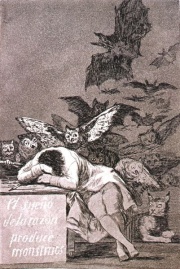Beast
From The Art and Popular Culture Encyclopedia
(Difference between revisions)
| Revision as of 21:32, 11 May 2008 Jahsonic (Talk | contribs) ← Previous diff |
Revision as of 20:03, 12 May 2008 Jahsonic (Talk | contribs) Next diff → |
||
| Line 3: | Line 3: | ||
| Any [[animal]] other than a [[human]]; usually only applied to [[vertebrate]]s, sometimes excluding [[bird]]s. Figuratively, a person who [[behave]]s in a [[violent]], [[antisocial]] or [[uncivilised]] manner. | Any [[animal]] other than a [[human]]; usually only applied to [[vertebrate]]s, sometimes excluding [[bird]]s. Figuratively, a person who [[behave]]s in a [[violent]], [[antisocial]] or [[uncivilised]] manner. | ||
| == See also == | == See also == | ||
| + | *[[Beauty and the Beast (1946 film)|''Beauty and the Beast'']] | ||
| *[[Beauty and the beast]] | *[[Beauty and the beast]] | ||
| *[[Bestiary]] | *[[Bestiary]] | ||
Revision as of 20:03, 12 May 2008
|
Related e |
|
Featured: |
Any animal other than a human; usually only applied to vertebrates, sometimes excluding birds. Figuratively, a person who behaves in a violent, antisocial or uncivilised manner.
See also
Unless indicated otherwise, the text in this article is either based on Wikipedia article "Beast" or another language Wikipedia page thereof used under the terms of the GNU Free Documentation License; or on research by Jahsonic and friends. See Art and Popular Culture's copyright notice.


